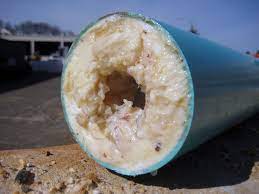Grease Blocks Town Sewer Line

Sewer line blocked with solidified grease. Photo: amherstma.gov
Source: amherstma.gov
The Town experienced a severe sewer line blockage on August 26 that caused sewage to enter and damage a single family home and two Amherst College dormitories. The blockage was caused by the improper disposal of cooking grease into our sewer system in the downtown area. Fats, oils, and grease should not be disposed of in sinks, drains, or toilets that connect to the Town’s sewer system.
Fats, oils, and grease solidify when they cool in the sewer pipes and coat the inside of the pipes. Over time the build-up can block the entire pipe resulting in sewer back-ups and overflows. On August 26, ten to twelve-inch long pieces of solidified grease were removed to clear the sewer line. These sewer line blockages have detrimental effects on our town and residents rely on strong sewer infrastructure for overall health. These events cost the town money in infrastructure repairs and spill clean-up, that can result in higher sewer fees for residents. In addition, sewage may flow into nearby streams and rivers, yielding to other potential public health concerns.
If you own a restaurant in Amherst and have a grease trap you are required to maintain it under your Food Establishment License. If you are a homeowner, it is improper to dispose of fats, oils, and grease in your sink, drain, or toilet. Below are some tips on how to correctly dispose of fats, oils, and grease.
- Do not pour fats, oils, or grease down sinks, drains, or toilets. Grease products include meat fats, lard, cooking oil, shortening, butter, margarine, food scraps, baking goods, sauces, and dairy products.
- Scrape grease and food scraps from trays, plates, pots, pans, utensils, grills and cooking surfaces into a can or the trash for disposal.
- Do not put grease products down garbage disposals. These units are for shredding solids and do not prevent grease from going down the drain.
- Place baskets/strainers in sink drains to catch food scraps and other solids and empty the baskets/strainers into the trash for disposal.
- If you have a grease trap on your property, proper maintenance of the trap can help in preventing grease from going into the system.

Yikes.
This may demonstrate how many people may talk the talk (a healthy infrastructure/environment), but don’t walk the walk.
It reminds me of how many drivers (young, old, those with peace loving stickers on, or children in their cars) drive by our houses (and a pre-school! ) every day at speeds way in excess of the 25mph posted, or while holding a cell phone.
Words matter, but so do our actions. Adages (practice what you preach) become embedded in our vernacular for a reason. Just think of the tax dollars that have to be spent, or danger that is imposed on others because too many individuals justify exceptions for their own behavior.
Sean Burke
The town should inform *every* resident about this. I personally know this already, but I am sure way too many people don’t. When the water report, tax bill, *and* water bill goes out, there should be an orange warning sheet sent along describing this information. As it happens many times, it is not the culprits who have the sewer backed up, but someone inocent….
Renata S.
Renata, education is never unhelpful, but really, would not common sense or curiosity dictate or inform? It is not rocket science to assume that grease down the drain may build-up and clog pipes…it’s grease after all.
And, what of the numerous speed limit or school crossing signs, and news articles pronouncing the illegality of cell phone use while driving?
What we need to do is to stop raising the bar to accommodate those who don’t think beyond themselves, and hold all accountable for a lack of common sense or concern for the good of others over convenience for themselves.
Waste oil and grease has value. As part of Amherst Zero Waste objectives, residents and restaurants can be incentivized to sell their waste oil to collectors. Many restaurants already do this.
Waste oil can be processed into a diesel fuel additive trademarked biodiesel or bioheat. 5%-20% Biodiesel actually burns with less harmful emissions than regular diesel and can lubricate engine parts reducing the need for toxic additives.